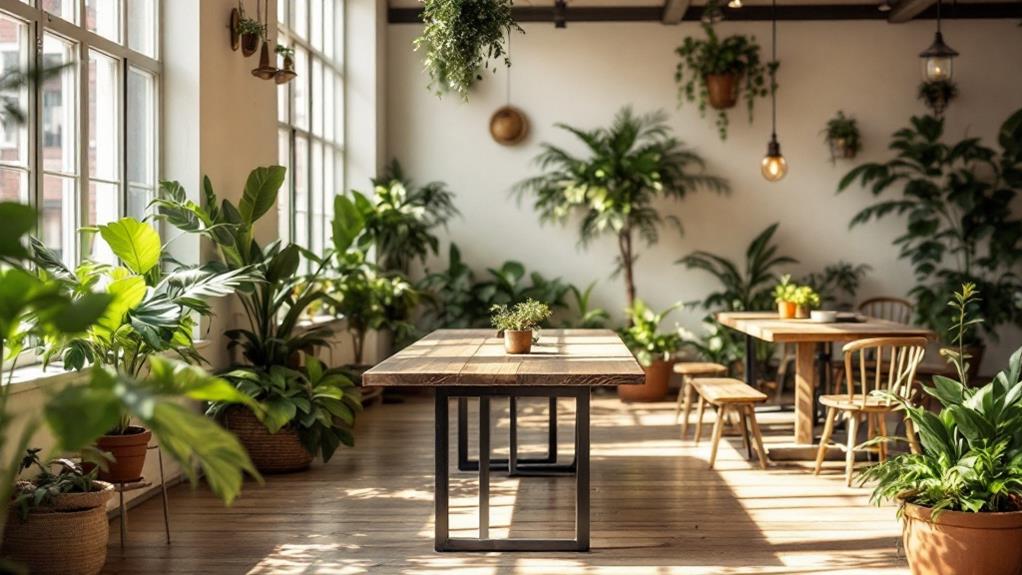
Review: The Most Sustainable Dining Tables Available Now
Finding the most sustainable dining tables requires careful examination of responsible sourcing, ethical production, and the use of materials like FSC-certified wood and reclaimed components. Brands such as Avocado and MasayaCo lead with eco-friendly designs that emphasize durability, reduced carbon footprints, and fair labor practices. These tables integrate sustainable elements, ensuring longevity and reducing waste impact. Design considerations include shape for functionality, and finishes for air quality improvement. By choosing dining tables that prioritize sustainability, consumers contribute positively to environmental efforts. Further exploration will reveal an array of options blending style, function, and eco-conscious values.
Key Takeaways
- Sustainable dining tables use FSC certified wood and reclaimed materials for environmental responsibility.
- Brands like Avocado and MasayaCo focus on eco-friendly finishes and ethical production practices.
- Sustainable designs prioritize longevity and minimal waste, promoting a circular economy.
- Customization options allow for personalized styles while maintaining eco-conscious standards.
- Price ranges cater to various budgets, offering sustainable options from $99 to $2,490.
Understanding Sustainable Furniture
Sustainable furniture represents an essential shift in manufacturing and consumption practices, emphasizing the importance of responsible sourcing and ethical production. By prioritizing the use of sustainable materials, such as FSC certified wood, manufacturers contribute to the preservation of forests and the promotion of ethical labor practices.
This approach starkly contrasts with the fast furniture trend, which results in over 12 million tons of discarded furniture annually in the U.S., underscoring the urgent need for eco friendly practices.
In addition to using responsibly sourced materials, sustainable furniture brands focus on minimizing their carbon footprints. This is often achieved by incorporating renewable or recycled materials in their designs, which not only enhances indoor air quality but also guarantees production processes remain low-emission.
Moreover, customization options allow consumers to select eco-friendly materials and designs that align with their personal aesthetic preferences, thereby supporting sustainability in a personalized manner.
Engaging with sustainable furniture transcends mere aesthetic improvements; it is a contribution to a broader movement advocating for environmental responsibility and ethical consumption.
Importance of Eco-Friendly Dining Tables
The importance of eco-friendly dining tables is underscored by their responsible material sourcing, such as the use of FSC Certified wood, which mitigates deforestation and encourages sustainable forestry practices.
By prioritizing sustainable design, these tables considerably reduce the carbon footprint of furniture production through the use of renewable or recycled materials, thereby promoting environmental conservation.
Additionally, the durability of eco-friendly dining tables not only minimizes waste by reducing the frequency of replacements but also aligns with ethical labor practices, ensuring fair conditions for workers throughout the supply chain.
Responsible Material Sourcing
Harnessing responsibly sourced materials is essential in the production of eco-friendly dining tables, as it directly impacts environmental sustainability and ethical manufacturing practices.
Material sustainability is achieved through the use of FSC certified wood, a benchmark for guaranteeing that timber is harvested in a manner that supports forest management and minimizes deforestation. This is critical given that approximately one-third of wood from natural forests is designated for timber production, which underscores the importance of choosing furniture that aligns with sustainable practices.
Incorporating reclaimed wood further enhances material sustainability by reducing waste and lowering the energy consumption required for producing new materials. This approach not only preserves natural resources but also decreases the carbon footprint associated with conventional furniture manufacturing.
Ethical production is equally prioritized in sustainable dining tables. Brands dedicated to responsible material sourcing often use renewable materials and recycled components, which are pivotal in lowering environmental impact.
Furthermore, these brands guarantee fair labor conditions and bolster local economies, addressing ethical concerns that are frequently overlooked in traditional manufacturing settings.
Sustainable Design Benefits
Eco-friendly dining tables present a multitude of advantages that extend beyond mere aesthetics, offering substantial contributions to environmental preservation and sustainability.
These tables often incorporate sustainable materials such as FSC Certified wood, reclaimed wood, or bamboo. Utilizing these responsibly-sourced materials greatly mitigates the environmental impact associated with deforestation and unsustainable forestry practices. By opting for such eco-conscious options, the carbon footprint of furniture production is remarkably reduced, fostering a more sustainable approach to home furnishing.
Additionally, sustainable dining tables are meticulously designed for longevity, enhancing their durability and decreasing the frequency of replacements. This aspect not only curtails waste accumulation in landfills but also aligns with principles of a circular economy, guaranteeing resources are utilized efficiently.
Moreover, the use of natural finishes and chemical-free materials in these tables contributes positively to indoor air quality, promoting a healthier living environment.
In addition to these environmental and health benefits, sustainable dining tables often boast timeless designs. Their ability to blend seamlessly with modern decor ensures they remain relevant and functional, which extends their lifecycle and reduces the need for future purchases.
This multifaceted approach underscores the crucial role eco-friendly dining tables play in advancing sustainability efforts.
Top Sustainable Dining Table Brands
Exploring the landscape of sustainable dining table brands reveals a commitment to eco-conscious practices and quality craftsmanship.
Avocado, a Certified B Corp and member of 1% for the Planet, epitomizes sustainable innovation by utilizing FSC-certified virgin wood and zero-VOC finishes. This not only guarantees a healthier home environment but also reflects a dedication to artisan craftsmanship through environmentally responsible methods.
MasayaCo stands out with its carbon-negative model and dedication to sustainable forestry, having planted over a million trees. Known for its handcrafted teakwood furniture, MasayaCo's commitment to artisan craftsmanship is evident in each piece, all while maintaining FSC certification, underscoring their sustainable innovation.
Urban Natural offers a distinctive approach by focusing on American-made furniture, with 90% of its partners crafting items domestically. This reduces carbon footprints and guarantees ethical labor practices, aligning with eco-conscious values.
Maiden Home, a BIPOC and woman-owned company, emphasizes slow crafting and heirloom-quality, utilizing solid ash construction for durability.
Their emphasis on long-lasting pieces showcases a blend of artisan craftsmanship and sustainable innovation, guaranteeing each table is a reflection of quality and responsibility.
Material Choices for Sustainability
A wide array of sustainable materials is now available for crafting dining tables, each contributing uniquely to environmental preservation. Among these, reclaimed wood stands out as a prime choice, utilized by brands like Avocado and MasayaCo. This material not only reduces the need for new timber harvesting but also minimizes waste destined for landfills, embodying a circular economy approach.
The use of reclaimed wood guarantees that dining tables are not only aesthetically pleasing but also environmentally responsible.
Bamboo offers significant ecological advantages as well. Known for its rapid growth and ability to absorb more carbon dioxide compared to traditional timber, bamboo benefits both the environment and sustainable furniture design. Its application in dining tables is gaining popularity due to these inherent environmental benefits.
Furthermore, materials such as FSC Certified wood assure that timber is sourced from responsibly managed forests, prioritizing biodiversity and environmental health.
To enhance sustainability, some manufacturers incorporate zero-VOC finishes, which contribute to improved indoor air quality by reducing harmful emissions. Additionally, the use of recycled metals for table legs supports renewable material practices, lowering the carbon footprint associated with furniture production.
Collectively, these material choices reflect a commitment to sustainable innovation in dining table design.
Design Features to Consider
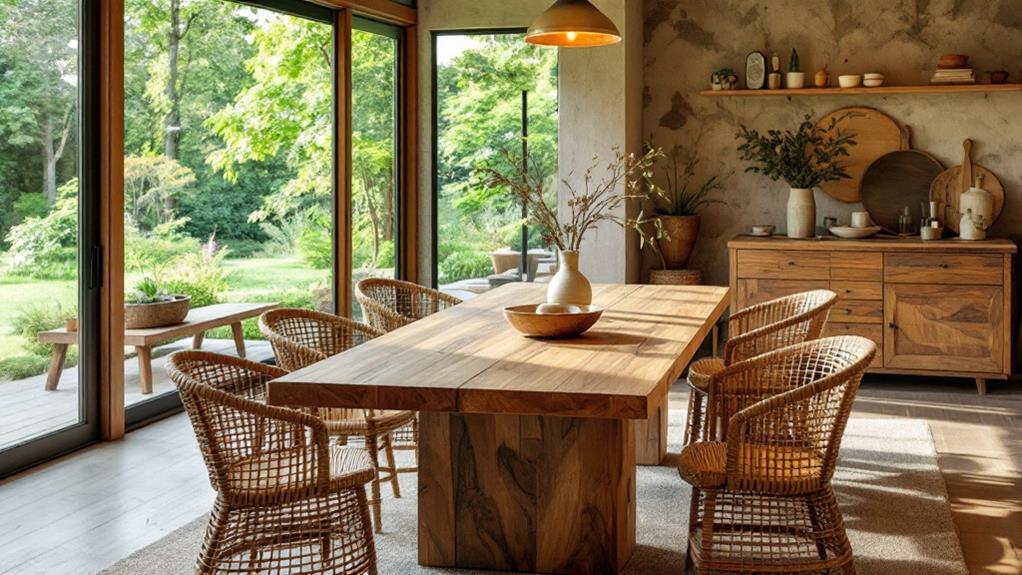
When evaluating sustainable dining tables, it is essential to take into account how material choices, such as FSC-certified wood and reclaimed materials, impact both environmental responsibility and the unique character of each piece.
The shape of the table also plays a significant role in functionality, influencing how space is utilized and accommodating various dining needs.
Striking a balance between aesthetic appeal and practical durability guarantees that a table not only complements its surroundings but also supports long-term sustainability through its craftsmanship and use of eco-friendly finishes.
Material Choices Matter
In the domain of sustainable dining tables, material choices stand paramount, as they greatly influence environmental impact and design functionality.
Wood sustainability is a crucial factor, with many tables crafted from FSC Certified wood, ensuring responsible sourcing. This not only aids in the protection of natural forests but also combats the pervasive issue of deforestation.
Reclaimed wood and bamboo are gaining favor due to their minimal environmental footprint; they efficiently repurpose existing resources, thereby reducing waste.
Eco friendly finishes play a crucial role in sustainable design, with many tables featuring natural, zero-VOC options that enhance indoor air quality by minimizing harmful emissions.
This commitment to healthier living spaces reflects a broader dedication to sustainability, marrying function with eco-conscious aesthetics.
The integration of renewable or recycled materials further underscores the importance of ethical production, lowering carbon footprints and supporting fair labor practices.
As consumers, the choices we make have a profound impact; consider:
- The allure of a table crafted from reclaimed wood, telling a story of transformation and renewal.
- The peace of mind from selecting a product with eco friendly finishes, promoting health and well-being.
- The significance of supporting ethical labor practices through mindful material choices.
Shape Influences Function
While material choices form the backbone of sustainable dining table design, the shape of a table plays an essential role in determining its functionality and the dynamics of the dining experience.
Round tables are particularly effective in fostering conversation and social interaction, as they allow guests to face each other without obstructions. This makes them ideal for intimate gatherings where the focus is on dialogue and engagement. However, their capacity is often limited, making them less suitable for larger groups.
In contrast, rectangular tables provide a pragmatic solution for those who frequently host large gatherings. Their linear design accommodates more people, and when paired with extendable features, they offer remarkable versatility. This adaptability guarantees that a single table can cater to both everyday family meals and larger occasions, aligning with sustainable principles by reducing the need for multiple furniture pieces.
For smaller spaces, compact designs like square tables optimize limited areas without compromising on utility. Additionally, the seating choice between benches and chairs can further influence spatial efficiency.
Benches, for instance, can offer flexible seating arrangements and are particularly beneficial in narrow spaces. Ultimately, choosing the right shape is vital for enhancing both functionality and social dynamics in sustainable dining environments.
Aesthetic and Practical Balance
As consumers increasingly prioritize sustainability, the balance between aesthetic appeal and practical functionality becomes essential in selecting the right dining table. Achieving aesthetic harmony and practical elegance involves a meticulous consideration of design features and materials.
Opting for eco-friendly materials, such as FSC certified wood, not only guarantees responsible sourcing but also aligns with sustainable forestry practices. These materials contribute to a table's aesthetic harmony, providing a natural and timeless beauty.
Design shapes play a pivotal role in balancing aesthetics and practicality. Round tables, known for their ability to foster conversation, are ideal for intimate gatherings and social engagements. Conversely, rectangular tables offer seating flexibility, making them suitable for diverse settings and accommodating larger groups.
Unique features, like live edges, highlight the natural beauty and rustic charm inherent in wood, enhancing the overall aesthetic without compromising on functionality.
To evoke emotion and drive home the significance of these choices, consider the following:
- Timeless elegance: A dining table that never goes out of style.
- Conversations ignited: Round tables that bring people together.
- Enduring craftsmanship: Solid wood construction that stands the test of time.
Ultimately, the perfect dining table marries form and function, guaranteeing both aesthetic and practical needs are met.
Customization Options Available
With an increasing demand for eco-friendly furniture solutions, sustainable dining tables now offer a plethora of customization options that cater to both aesthetic preferences and functional requirements.
This trend toward design flexibility allows consumers to tailor their dining spaces to reflect personal style and practicality. Significantly, brands like Inside Weather have embraced these customization trends by offering choices between UV printed surfaces or traditional wooden finishes. This not only permits personalization but guarantees that the final product aligns seamlessly with the existing decor.
In terms of materials and forms, consumers can select from various shapes and sizes, accommodating different spatial constraints and dining needs. Additionally, the ability to choose between multiple base styles for table legs, such as hairpin and tapered designs, provides enhanced style and stability.
This level of customization extends to dining chairs, where options abound in styles and upholstery, assuring a harmonious and cohesive dining set.
These customizable features not only promote aesthetic diversity but also uphold the principles of sustainability by allowing consumers to create long-lasting, personalized pieces.
As eco-conscious choices become more prevalent, such customization options signify a promising shift towards sustainable innovation in home furnishings.
Ease of Assembly and Maintenance
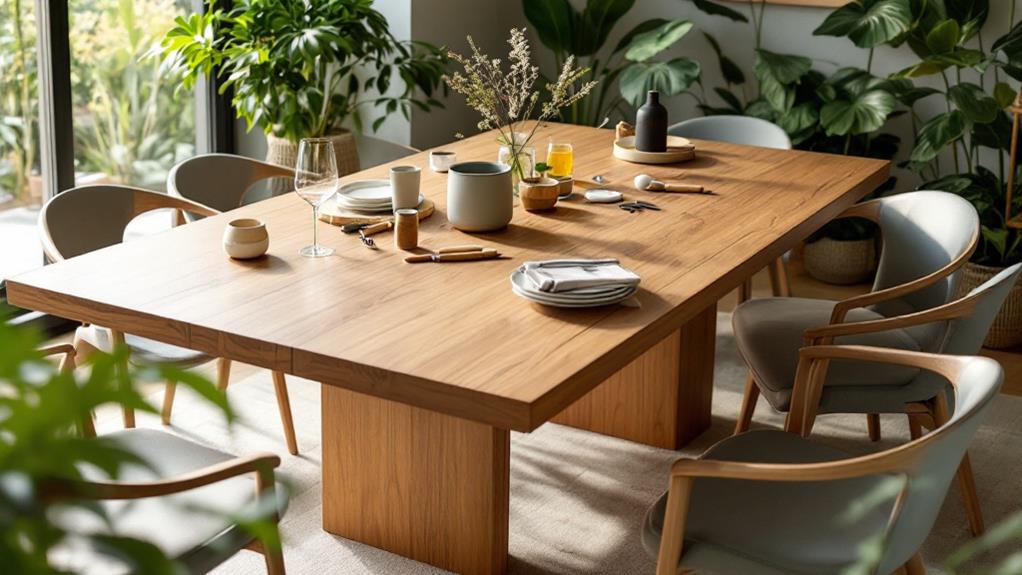
Customization in sustainable dining tables has become synonymous with both aesthetic appeal and functional versatility, but another critical aspect consumers consider is the ease of assembly and maintenance.
Sustainable brands like Inside Weather excel with their user-friendly designs, enabling quick assembly in approximately five minutes. However, when it comes to dining chairs, the complexity can increase, necessitating a two-person approach for ideal stability and ease of setup.
For those seeking hassle-free solutions, many companies provide a white glove delivery option, which includes professional assembly and packaging removal for a fee, greatly enhancing customer satisfaction.
When considering maintenance routines, sustainable dining tables are designed for simplicity. A straightforward cleaning process helps preserve the durability and appearance of these eco-friendly pieces.
Customers often report high satisfaction, emphasizing the stability and long-lasting reliability of both tables and chairs. This positive feedback highlights the effective balance of sustainable design and practicality.
Key Highlights:
- Quick and easy table assembly: Inside Weather tables assemble in about five minutes.
- Stable and reliable: Customers consistently praise the sturdiness of sustainable furniture.
- Convenient delivery options: White glove service guarantees smooth setup and removes packaging waste.
Price Range and Affordability
Maneuvering the price range and affordability of sustainable dining tables reveals a spectrum of choices that cater to diverse budgets while maintaining eco-conscious values. The market offers options from budget-friendly selections like IKEA at $99, to premium pieces such as House of Léon starting at $2,490. This wide range allows consumers to engage in a price comparison that aligns with both financial constraints and sustainable materials preferences.
| Brand | Starting Price | Key Features |
|---|---|---|
| IKEA | $99 | Affordable, basic design |
| Grain and Frame | £359 | Customizable, sustainable focus |
| Roseland Furniture | £554.95 | Quality construction, mid-range |
| Eva | $900 | B Corp certified, solid wood |
Brands like Grain and Frame and Roseland Furniture make sustainable materials more accessible, with tables priced at around £359 and £554.95, respectively. Meanwhile, B Corp certified Eva offers solid wood tables at $900, showcasing a commitment to sustainability and craftsmanship. Investing in such durable furniture proves economical, as quality reduces the need for replacements, minimizing environmental impact. Through thoughtful price comparison, eco-conscious consumers can find sustainable dining tables that balance affordability with ethical production, ensuring a long-term, sustainable choice.
Customer Feedback and Reviews

In evaluating customer feedback on sustainable dining tables, users consistently highlight the superior durability and quality of these pieces, with many noting long-term satisfaction.
The aesthetic appeal and personalization options, such as finishes and sizes, further enhance user experience, aligning with eco-conscious living.
Additionally, ethical sourcing practices and straightforward assembly processes contribute positively to the overall product assessment, reflecting a harmonious blend of functionality and sustainability.
User Experience Insights
Amid growing consumer awareness towards eco-friendly living, customer reviews of sustainable dining tables reveal a consistent pattern of satisfaction, particularly emphasizing the durability and aesthetic appeal of these products.
Current user experience trends indicate that consumers are not only seeking furniture that complements their home decor but also aligns with their eco-conscious values. This dual focus on aesthetics and sustainability has resulted in high customer satisfaction, as these tables are praised for their longevity and minimal environmental impact.
Notable insights from user feedback include:
- Customization Options: Many users appreciate the ability to select materials, shapes, and finishes that cater to their unique design preferences, enhancing both functionality and personal style.
- Ease of Assembly: Reviews often highlight the straightforward assembly process, which contributes to a positive user experience by reducing setup time and complexity.
- Ethical Pride: Owners express a strong sense of pride in choosing sustainably sourced furniture, often citing this as a key factor in their purchasing decisions.
Additionally, the long-term value of these tables is frequently acknowledged, with customers noting the investment in high-quality, sustainable materials as a wise choice that minimizes future replacements.
This feedback underscores the growing demand for products that marry sustainability with enduring design.
Product Quality Assessment
As the conversation around sustainable dining tables shifts from user experience insights to product quality assessment, it is clear that customer feedback plays a significant role in understanding these products' value. In the domain of sustainability trends, the durability and stability of these tables are frequently praised, with many families attesting to their resilience in high-traffic environments. Such endorsements highlight these dining table innovations' ability to withstand the test of time, affirming their long-term viability.
Aesthetic appeal is another important factor, with reviews often mentioning how the unique designs of these tables contribute to an enhanced dining ambiance. Customers value the customization options, which enable them to align selections with personal tastes and home décor. Ease of assembly is another noted benefit, especially regarding tables, which often require just a straightforward five-minute setup. This contrasts with the more intricate assembly of accompanying chairs.
| Feature | Customer Feedback | Implication |
|---|---|---|
| Durability | Highly durable in busy settings | Long-term sustainability |
| Aesthetic Appeal | Enhances dining space ambiance | Raises home décor |
| Customization Options | Tailored to personal taste | Increased consumer satisfaction |
| Assembly Ease | Quick setup for tables | User-friendly design |
| Ethical Sourcing | Appreciation for eco-friendly practices | Positive brand perception |
These insights reflect a rising consumer awareness and appreciation for ethical sourcing and environmentally conscious practices.
Comparing Durability and Longevity
Sustainable dining tables crafted from reclaimed wood stand as a demonstration to durability and longevity, marrying environmental responsibility with practical functionality.
These tables not only reduce waste but also capture unique character, as each piece retains original markings and grains that enhance its aesthetic appeal. With wood types such as North American Pine and oak, these tables offer enduring strength.
Solid wood options are renowned for their resilience, and when paired with meticulous table finishes, they guarantee longevity, with the capacity to withstand daily use for decades.
Quality craftsmanship in sustainable dining tables often includes design features such as reinforced joints, which greatly enhance durability. This thoughtful construction makes them suitable for both everyday dining and special occasions, guaranteeing that they remain a central part of the home for years to come.
Investing in tables made from FSC-certified wood not only supports ethical manufacturing practices but also contributes to a reduced carbon footprint, given that wood production demands less energy than synthetic alternatives.
- Unique character and aesthetics: Original markings and grains tell a story.
- Enduring strength: Solid wood options like oak and pine guarantee lasting use.
- Environmental impact: Ethically sourced materials support sustainability.
Best Dining Tables for Families
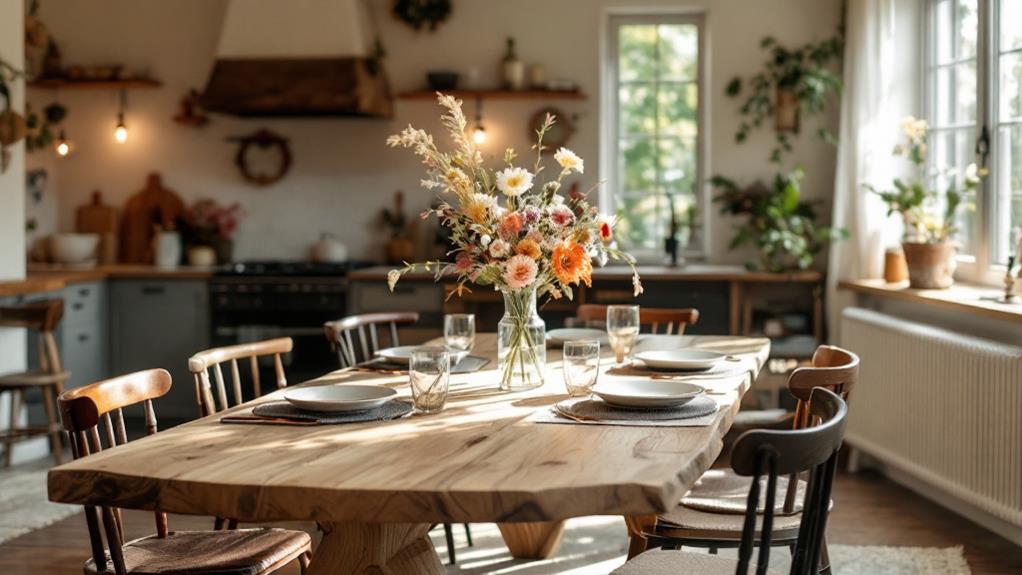
Reclaimed wood dining tables exemplify durability and longevity, yet their value extends beyond these attributes, particularly when considering family dining environments.
These tables serve as the centerpiece for family bonding, facilitating meal traditions that are essential for fostering emotional well-being. Research suggests that regular family dinners are associated with lower depression rates and enhanced resilience in children, underscoring the importance of a reliable dining table in nurturing these connections.
A key consideration for families is the sustainable nature of these tables. Options like the Grain and Frame Extendable Table offer family-friendly features such as extendability, ensuring that even unexpected guests can be accommodated comfortably.
In addition, solid wood tables from brands like Avocado and MasayaCo contribute to a healthier indoor environment by minimizing harmful VOC emissions, vital for maintaining family health.
Investing in tables crafted from FSC Certified wood not only supports sustainable forestry practices but also assures families of responsible sourcing.
Such tables are designed with both functionality and family needs in mind, offering a range of shapes and sizes suited to diverse dining spaces. This meticulous design approach underscores the pivotal role of dining tables in preserving meal traditions and promoting family bonding.
Aesthetic Appeal and Style
The integration of natural beauty and eco-conscious craftsmanship is vividly exemplified in sustainable dining tables, where aesthetic appeal and style converge to create functional art. Unique designs often highlight the inherent elegance of eco-friendly materials like reclaimed wood and FSC-certified timber.
Artisanal craftsmanship, as seen in options like Grain and Frame's live edge tables, captures the essence of modern design trends while retaining a timeless rustic charm. The strategic use of contrasting materials, such as solid wood paired with sleek metal legs, achieves a striking visual balance, catering to contemporary and industrial decor styles.
- Natural Beauty: Reclaimed wood and FSC-certified timber reveal striking grains and textures.
- Artisanal Craftsmanship: Custom finishes and live edge designs reflect modern trends.
- Contemporary Balance: Solid wood combined with metal legs suits diverse aesthetics.
Timeless minimalistic designs are a hallmark of sustainable tables, integrating geometric shapes and clean lines to guarantee versatility across various interiors.
The natural grains and textures of sustainable materials not only add character but transform each table into a distinctive showcase piece. These tables stand as a demonstration of material innovations, offering both functionality and an eco-conscious design ethos.
Eco-Friendly Certifications and Standards
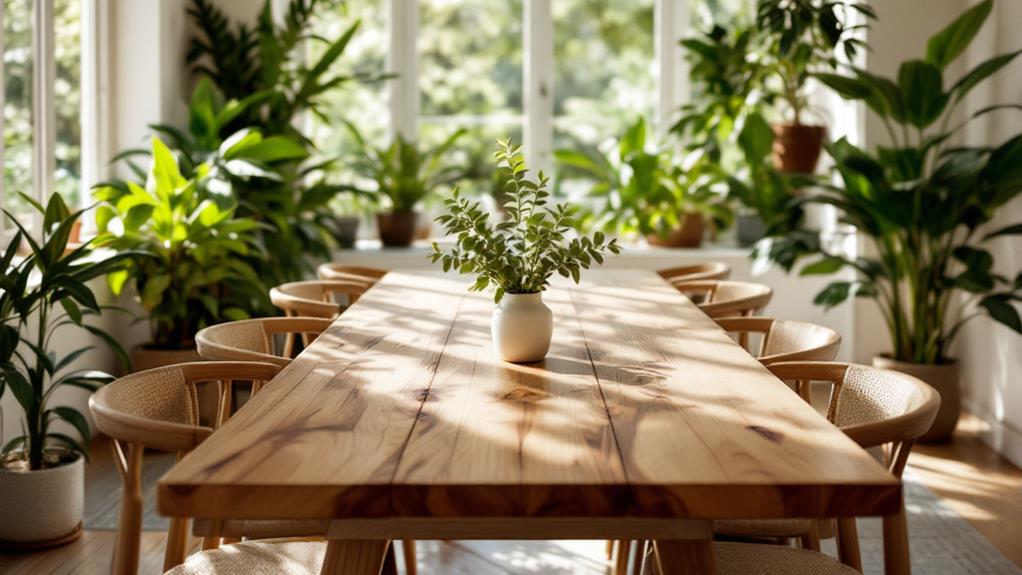
Maneuvering the landscape of eco-friendly furniture involves understanding a range of certifications and standards that affirm the sustainability of materials and practices. The eco label importance cannot be overstated as it provides consumers with a clear indication of the environmental and social responsibility embedded in the product. Certifications such as the Forest Stewardship Council (FSC) and the Sustainable Forestry Initiative (SFI) play a vital role in guaranteeing that wood products are sourced from responsibly managed forests. These eco labels assure consumers of the certification impact by promoting sustainable forest management and responsible sourcing.
In addition to wood certifications, other eco-friendly certifications enhance the appeal and trustworthiness of sustainable dining tables. B Corp certification signifies a brand's commitment to high standards of social and environmental performance, accountability, and transparency. Climate Neutral certification further emphasizes a company's dedication to offsetting their carbon emissions, aiming for a net-zero carbon footprint.
| Certification | Impact |
|---|---|
| FSC | Guarantees responsible forest management |
| SFI | Promotes sustainable sourcing practices |
| B Corp | High social and environmental performance standards |
| Climate Neutral | Commitment to net-zero carbon emissions |
| Made Safe | Guarantees products are free from toxic chemicals |
Made Safe certification underscores the significance of using non-toxic materials, contributing to a healthier environment and consumer safety.
Frequently Asked Questions
Which Major Furniture Company Is Making Efforts to Be More Sustainable?
IKEA initiatives focus on sustainability by pledging to use only renewable or recycled materials in their products by 2030. This forest-positive agenda aims to greatly reduce environmental impact, highlighting the company's commitment to sustainable materials and practices.
Is West Elm Actually Sustainable?
West Elm's sustainability is evidenced by its materials and practices, including sourcing over 90% of wood responsibly, implementing a Forest Stewardship Policy, participating in reforestation, using recycled materials, and achieving B Corporation certification for environmental performance.
What Type of Furniture Is Most Sustainable?
The most sustainable furniture incorporates eco-friendly materials and recycled wood, emphasizing environmental responsibility. Utilizing reclaimed wood reduces landfill waste, while durable designs guarantee longevity, promoting a sustainable consumption model by minimizing the need for frequent replacements.
How Do I Choose Sustainable Furniture?
To choose sustainable furniture, prioritize eco-friendly materials, such as FSC Certified wood, and focus on ethical sourcing by selecting brands committed to responsible forestry and fair labor practices, ensuring both environmental and social sustainability in your purchase decisions.
Conclusion
The exploration of sustainable dining tables necessitates an extensive understanding of eco-friendly materials, design features, and durability. Evaluating top brands reveals a commitment to utilizing responsibly sourced materials and adhering to stringent eco-certifications. The intersection of sustainability with aesthetic appeal underscores the importance of these tables in contemporary households. Emphasizing longevity and environmental responsibility, sustainable dining tables represent a vital advancement in furniture design, aligning consumer choices with broader ecological imperatives. This approach fosters a more sustainable future in home furnishings.

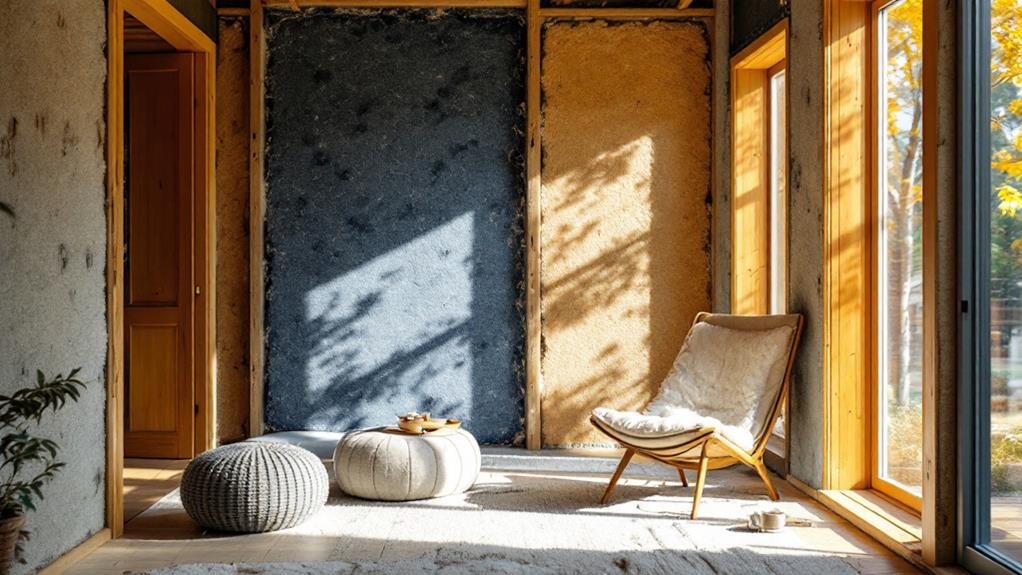

Leave a Reply